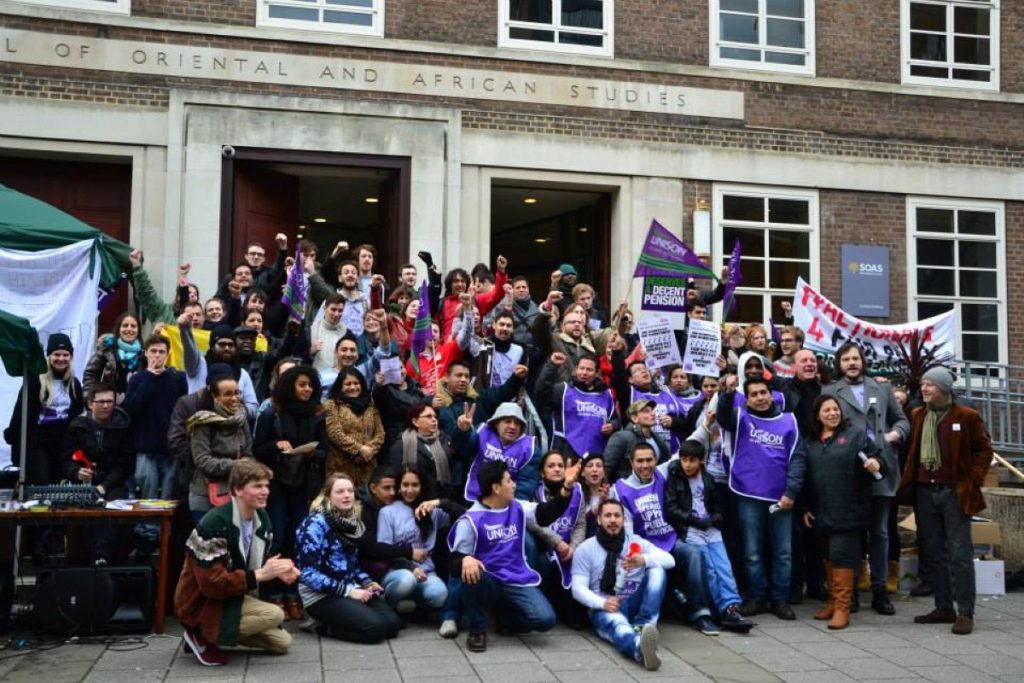Immigrant Stories: Lenin and the fight for cleaners’ pay
Lenin, as you may expect, is on the picket line.
"I come from a very political family," he tells me, amid the din of whistles and chanting at SOAS University campus. "My mother was one of the leaders of the Leninist Marxist Communist party of Ecuador.
"The party was exterminated by the government and many members were killed. My mother gave up politics because she was worried about my safety. She didn't explain to me why I was called 'Lenin' or who he was. I found out a few years later."
Lenin came to the UK in 2000, a year after the freeze on Ecuadorian bank accounts forced millions of his fellow countrymen to look for a better life elsewhere.


"The UK was well known around the world as a country which respects human rights, which tries to free people from dictators. I thought that's a nice country to be in, let me try to go there."
As soon as he arrived he started doing cleaning work.
In the beginning he and his fellow workers tried to get through life in London on the minimum wage, then around £5 an hour. He met his wife – another Ecuadorian living in London – and became a father.
After a few years he started organising with fellow cleaners for a better life.
The staff were working in SOAS University campus in central London, but they were employed by a succession of outsourced cleaning firms.
"They were all the same," he says.
"You are the best cleaner if you do not complain. As soon as you fight for your rights or fair wages, that's it – you are a troublemaker. You are the worst cleaner. And they do whatever they can to get rid of you.
"If they ordered us to do more work for no pay we couldn't refuse. If you don't want to do it it's like: 'Thank you, don't come tomorrow'. If you want to live and get money, you stay quiet and they keep on abusing you."
One transfer of cleaning contracts left workers without three months' worth of wages. They sought advice from the university union, which took up the fight for the three months' pay, the London living wage, union recognition and for the cleaning staff to be employed directly in-house by the university.
The campaign lasted for a year. The workers secured all their aims, except for the last one. The university claimed it would cost too much to bring them onto the balance sheet.
"After we got the living wage our situation improved a lot," he says.
"Now I belong to a union, I am not afraid to protest for my rights."
But the retention of outsourced services meant the cleaners were still vulnerable. The cleaning company only pays statutory benefits – sick pay, holiday and pensions. It is far below the payments offered to staff in the university.
"One day a chair fell on my foot," he says.
"I lost three toe nails. The doctor gave me one month's leave. I was away from the job for three weeks. Statutory sick pay only started after four days and then paid just £124 per week. But my rent was £110. I couldn't pay it.
"I had to eat. I have three kids. I needed to feed my family. For three weeks I was in arrears. The council took me to court."
"When university staff get sick they get paid the full amount of their salary, but not us. We are cleaners. We get sick all the time. But if you contract something you can't look after your children."
This was the issue that triggered the current strike – a 48-hour action on Tuesday and Wednesday this week, which was backed by academic staff and students. As I speak to Lenin, I can hear chanting in English and Spanish under the spring sunshine.
"We used to be invisible. Now we are visible," he says.
"We are all together. We will keep on fighting until we get what we want: equal rights and justice."
Lenin returned to work this morning. This is his immigrant story.












